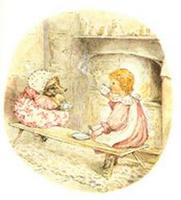Doesn't it stand to reason that if you bake a cake with pineapples at the bottom of the pan with the intention of inverting it that it makes the part with pineapples the top of the cake?
A British friend actually asked me this. Subsequently, I learned that if you want to really go crazy (or mad) discussing pastries, try talking about biscuits with a Brit. They find it quaint how we call biscuits, cookies. A favourite with a u of theirs is the digestive biscuit. This is a product name which is so far from Madison Avenue that it sounds completely repulsive and alien to us. I suppose it is actually. To the untrained American ear it sounds a lot like a laxative. Likewise, we seem to find it entertaining how they call cookies, biscuits; however, this is because we already have biscuits. Although, our biscuits are more like scones-- only less sweet-- to them and we haven't got scones. Then we're placed in the precarious position of being forced to feign horror when they ask for clotted cream for their American biscuits.
Our stereotypical idea of the British and pastries must always include the phrase, tea and crumpets. Like scones, we haven't got crumpets either, but we've got English muffins which are crumpet-like only more sweet. Ironically, they've got English muffins like our English muffins but since they're already in England they tend to gloss over the national specification. As in the buttermilk biscuit, scone and clotted cream dilemna, there is always the risk that your British guests may request marmite with their cruffins. Without going into detail, let's just say that feeding American children marmite is a good way to get on the wrong side of child and family services. Marmalade is much safer and is also transatlantically acceptable as a crumpet or American English muffin accompaniment.

Americans do fancy the notion of sitting down to high tea (and crumpets-- see? you can't help yourself) Oddly enough, tea has become synonymous with their-- the Brit's that is-- evening meal which we would call dinner. So, we should be fully prepared to put on our best vacant expressions in the event they tell us something like, say, they've had Bubble and Squeak for tea. Who are they? we're inclined to question, imagining charming little talking animals from a Beatrix Potter tale.
On the subject of pastries is dessert, which they would call, pudding, or afters. Afters makes sense but pudding seems awfully specific. This is why the concept of a Yorkshire Pudding is confusing to us. A Yorkshire Pudding is not a dessert, but a sort of popover sort of bread type thing flavoured with a u by pan drippings from some sort of roast. Or something of the sort. They are very easy to make very poorly but we're American so we don't know any better. The secret of Yorkshire Pudding is that if they're made well, they're really not much better than if they're made poorly. Anyway, the bottom line is that unlike a dessert, aka, pudding, a Yorkshire Pudding is actually something you would consume during your meal rather than after-- unlike afters which you would consume...um (or erm)... after. See? It's confusing even if you explain it.
So, if you want to pop round for tea after work, I can't promise you crumpets, clotted cream or marmite. However, if you'll be Bubble, I'll be Squeak.
2 comments:
Yes, quite confusing I must say. And now that you mention it, I'm quite thirsty for tea, hold the crumpets please.
I think those crazy Brits just change the name of things to be difficult. Or maybe WE changed the names of things cause we didn't want to be like them anymore? Or maybe it's all a secret code? I dunno. Screw tea and crumpets - give me coffee and a donut!
Post a Comment